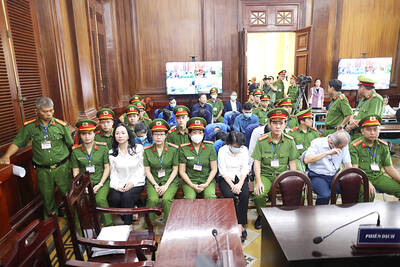Opponents of military rule in Myanmar yesterday inscribed messages of protest on Easter eggs, while others were back on the streets, facing off with security forces after a night of candle-lit vigils for hundreds killed since a Feb. 1 coup.
In the latest in a series of impromptu shows of defiance, messages including: “We must win,” “Spring revolution” and “Get out MAH,” were seen on eggs in photographs on social media, the latter referring to the junta leader, Burmese Army Senior General Min Aung Hlaing.
Easter is not widely observed in predominantly Buddhist Myanmar.

Photo: Reuters
The Assistance Association for Political Prisoners (AAPP), an advocacy group monitoring casualties and arrests since the military deposed civilian leader Aung San Suu Kyi and her government, said that the death toll had as of late on Saturday risen to 557.
“People across Burma continued striking for the end of dictatorship, for democracy and human rights,” the group said, using another name for the Southeast Asian country.
Despite the killings, protesters continue to turn out every day in towns big and small to reject the return of military rule after a decade of tentative steps toward democracy.
Numerous candle-lit vigils took place on Saturday night.
Early yesterday, hundreds of people protested in Mandalay, some on foot, others on motorbikes, images on social media showed, before police and soldiers moved in to disperse them.
Protesters also gathered in several other towns.
There were no immediate reports of violence.
Police and a spokesman for the junta did not answer telephone calls seeking comment.
Opponents of military rule often arrange creative shows of defiance, which on Easter extended to eggs.
The AAPP said that 2,658 people were in detention, including four women and a man who last week spoke with a visiting CNN news crew on the streets of Yangon.
A CNN spokesman said that it was aware of reports of detentions following the team’s visit.
“We are pressing the authorities for information on this, and for the safe release of any detainees,” the spokesman said.
The military is waging its own campaign to control information and stifle dissent.
It ordered Internet providers to cut wireless broadband from Friday last week, depriving most customers of access, although some messages and pictures were still being posted and shared.
Authorities have issued arrest warrants for nearly 40 celebrities known for opposing military rule, including social media influencers, singers and models, under a law against inciting dissent in the armed forces.
The charge — announced in the main evening news bulletin broadcast by state media on Friday and Saturday last week — can carry a prison term of three years.
One of those charged, blogger Thurein Hlaing Win, said that he was shocked to see himself branded a criminal on television and has gone into hiding.
“I didn’t do anything bad or evil. I stood on the side of truth. I followed the path I believe in. Between good and evil, I chose good,” he said by telephone from an undisclosed location. “If I get punished for that, my conscience is clear. My beliefs will not change. Everyone knows the truth.”

Republican US lawmakers on Friday criticized US President Joe Biden’s administration after sanctioned Chinese telecoms equipment giant Huawei unveiled a laptop this week powered by an Intel artificial intelligence (AI) chip. The US placed Huawei on a trade restriction list in 2019 for contravening Iran sanctions, part of a broader effort to hobble Beijing’s technological advances. Placement on the list means the company’s suppliers have to seek a special, difficult-to-obtain license before shipping to it. One such license, issued by then-US president Donald Trump’s administration, has allowed Intel to ship central processors to Huawei for use in laptops since 2020. China hardliners

A top Vietnamese property tycoon was on Thursday sentenced to death in one of the biggest corruption cases in history, with an estimated US$27 billion in damages. A panel of three hand-picked jurors and two judges rejected all defense arguments by Truong My Lan, chair of major developer Van Thinh Phat, who was found guilty of swindling cash from Saigon Commercial Bank (SCB) over a decade. “The defendant’s actions ... eroded people’s trust in the leadership of the [Communist] Party and state,” read the verdict at the trial in Ho Chi Minh City. After the five-week trial, 85 others were also sentenced on

Conjoined twins Lori and George Schappell, who pursued separate careers, interests and relationships during lives that defied medical expectations, died this month in Pennsylvania, funeral home officials said. They were 62. The twins, listed by Guinness World Records as the oldest living conjoined twins, died on April 7 at the Hospital of the University of Pennsylvania, obituaries posted by Leibensperger Funeral Homes of Hamburg said. The cause of death was not detailed. “When we were born, the doctors didn’t think we’d make 30, but we proved them wrong,” Lori said in an interview when they turned 50, the Philadelphia Inquirer reported. The

RAMPAGE: A Palestinian man was left dead after dozens of Israeli settlers searching for a missing 14-year-old boy stormed a village in the Israeli-occupied West Bank US President Joe Biden on Friday said he expected Iran to attack Israel “sooner, rather than later” and warned Tehran not to proceed. Asked by reporters about his message to Iran, Biden simply said: “Don’t,” underscoring Washington’s commitment to defend Israel. “We are devoted to the defense of Israel. We will support Israel. We will help defend Israel and Iran will not succeed,” he said. Biden said he would not divulge secure information, but said his expectation was that an attack could come “sooner, rather than later.” Israel braced on Friday for an attack by Iran or its proxies as warnings grew of